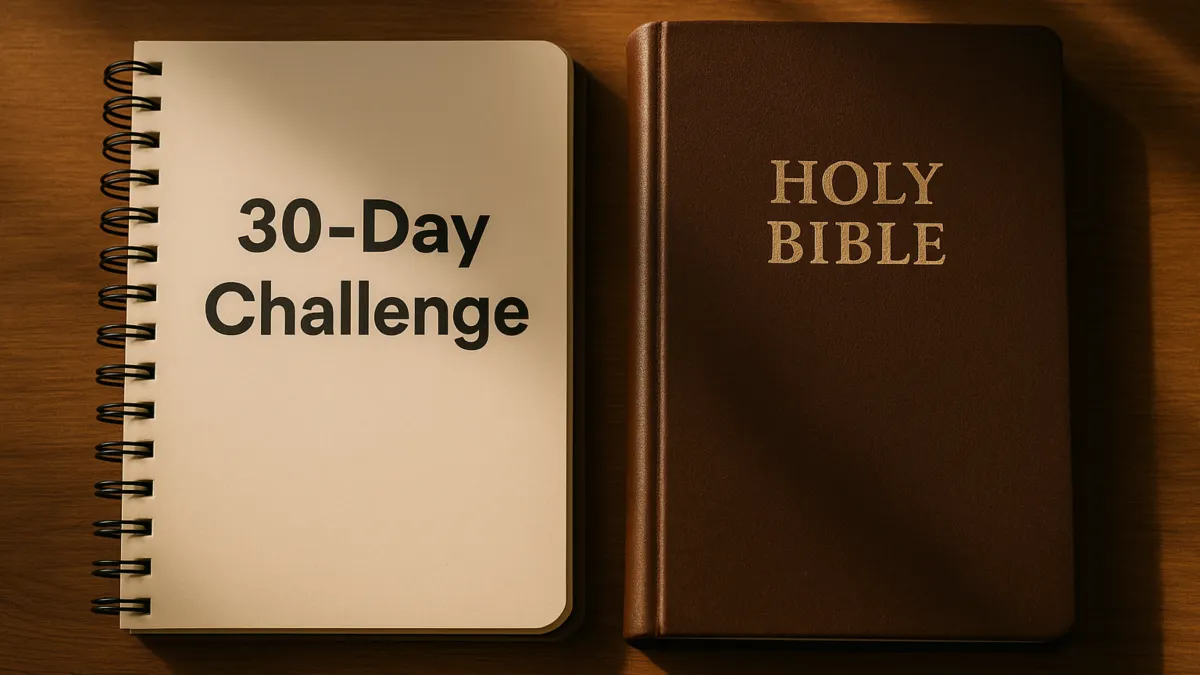
30 Days of Faith and Finances: A Christian Debt-Freedom Challenge for Lasting Change
The endless stream of bills, the quiet stress when you check your bank balance, and the thought that no matter how much you earn, it never feels like enough. For many Americans, that tension between faith and finances feels unresolvable. This 30 Days of Faith and Finances challenge brings both together through scripture, prayer, and small daily actions that build lasting change.
Faith was never meant to stay separate from everyday life. How you spend, save, and give reflects what you value most. By following a consistent spiritual and financial practice for 30 days, you begin replacing worry with purpose and uncertainty with clarity.
Why debt freedom supports your faith journey
Debt affects more than your wallet. It quietly drains your peace, your time, and your ability to live generously. Total household debt in the United States reached $18.39 trillion in the second quarter of 2025, rising by $185 billion from the previous quarter (Source: Federal Reserve Bank of New York). The average American household carries around $105,000 in total debt (Source: The Motley Fool).
Debt itself isn’t always sinful or reckless, but it can limit your ability to serve, give, and focus on what matters. In scripture, stewardship is the guiding principle of money management. Resources are entrusted, not owned. When you take that seriously, paying down debt becomes less about guilt and more about restoring your ability to act on your calling. (Source: Focus on the Family)
Another insight that many overlook is that most Americans spend about 11.25% of disposable income on required payments (Source: Federal Reserve). The issue is rarely total income but how consistently that income is directed. A clear plan, guided by faith, turns numbers into progress.
What the 30 Days of Faith and Finances challenge involves
Each day includes three parts: one scripture passage, one prayer, and one simple financial action. The process keeps things doable while building momentum.
On Day 1, you might write down every unsecured debt you owe and ask God for wisdom to face the truth without fear. On Day 10, you could track every expense for a week to uncover where money quietly disappears. By Day 20, you might call a lender to request a lower interest rate or discuss payment options. Small actions build consistency, and consistency builds control.
Americans often avoid starting because the problem feels too large. Yet progress always begins with visibility. The challenge teaches you to look honestly at your finances while remembering that discipline is a form of worship, not punishment. The purpose isn’t instant transformation. It’s consistent redirection, one decision, one day, one prayer at a time.
After 30 days, you’ll notice patterns. You’ll see which habits serve you and which do not. You’ll have more clarity about where your money goes and how your values fit into the picture. That clarity is what allows change to last long after the challenge ends.
How faith strengthens your financial discipline
Faith gives structure to financial decisions. When you anchor your choices to biblical truth, you build a system that outlasts motivation. Proverbs 21:5 reminds us that “the plans of the diligent lead to profit as surely as haste leads to poverty.” Planning, saving, and giving are all spiritual acts.
Research supports the connection between faith and financial well-being. Studies show that those who engage with faith communities or faith-based values around money often experience stronger habits of saving, charitable giving, and budgeting. (Source: Wiley Online Library) This doesn’t happen by magic. It happens when principles like contentment, gratitude, and stewardship shape your financial choices.
Many Americans associate wealth with accumulation. Faith reframes that idea. Wealth is measured by freedom, freedom from debt, freedom to give, and freedom to live out your purpose. When you align money with mission, every dollar starts working toward peace instead of pressure.
The next step toward lasting freedom
Finishing the challenge is only the beginning. You’ve already proven that consistency and reflection can create change. The next step is to build a long-term plan that sustains the progress you’ve started.
Set up a monthly review to check spending and saving patterns. Create goals for giving and debt reduction that feel realistic, not overwhelming. Surround yourself with encouragement, through your church, your family, or financial mentors who share your values.
If you’re ready to continue what this challenge started, connect with Pathway316. The team can help you build a practical, faith-aligned plan for debt reduction, budgeting, and stewardship that supports the life God is calling you to live. Schedule your session today and begin turning 30 days of faith and finances into a lifetime of freedom.
Find financial peace through faith with Pathway316.